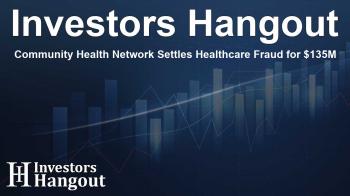Community Health Network Settles Healthcare Fraud for $135M

Groundbreaking Settlement in Healthcare Fraud Case
In a historic move for accountability in the healthcare industry, Community Health Network recently agreed to pay an additional $135 million to settle claims of healthcare fraud brought on by whistleblower Thomas P. Fischer. This settlement marks the culmination of a lengthy battle against fraudulent practices within the institution, enhancing recognition of the importance of protecting the integrity of healthcare systems.
Background of the Case
The case began more than a decade ago when Fischer, the former Chief Operating Officer and Chief Financial Officer of Community Health Network, filed a lawsuit on behalf of the United States against his former employer. The whistleblower's insights into the operations of Community revealed serious concerns about overpayments made to employed physicians. This unethical practice aimed to ensure patient referrals to Community's facilities, which violates federal laws such as the Stark Law.
Overpayments and Violations of Law
According to the allegations, Community Health Network overpaid both directly employed physicians and those associated with a contracted oncology group, Community Hospital Oncology Providers. This action directly influenced where patients were treated, leading to concerns over the ethical implications of such financial incentives. The Stark Law specifically prohibits these types of arrangements where financial arrangements can influence medical decision-making.
The Settlement Details
This settlement, although significant, is not an isolated case for Community Health Network. Last December, the network settled the first half of this fraud case, paying $345 million, bringing the total to approximately $480 million across three settlements in the last decade. This recent $135 million resolution encompasses both the governmental claims and personal claims from Fischer against the organization.
Team Effort for Justice
Fischer's legal team, which included partners from Joseph Greenwald & Laake, has worked tirelessly over the years to bring these allegations forward. Their commitment underscores the crucial role that whistleblowers play in holding organizations accountable. The success of this case illustrates how the partnership between former employees and the justice system can protect taxpayer interests while encouraging ethical behavior in healthcare practices.
Reflections from the Whistleblower
Reflecting on the journey, Thomas P. Fischer commented on the many challenges he faced, expressing gratitude for the support received from both his family and legal team. He emphasized that, although this was a lengthy and arduous process, it was aimed at ensuring accountability within Community Health Network. Fischer hopes that his story encourages others in similar situations to come forward and report any fraud they may encounter in the healthcare system.
The Impact on Healthcare
The implications of this case stretch beyond legal outcomes; they address significant concerns about the high costs of healthcare and how unethical practices contribute to these expenses. Fischer highlighted how these claims are not just legal technicalities but resonate deeply with patient care and financial integrity in healthcare delivery.
Future Considerations for Community Health Network
With three substantial settlements in less than a decade, it remains to be seen how Community Health Network will reform its practices moving forward. Legal experts suggest that the organization should consider revised policies for physician compensation and billing procedures to prevent similar issues from reoccurring in the future.
Advice for Fellow Whistleblowers
Fischer’s journey serves as a beacon of hope for potential whistleblowers. He encourages individuals in the healthcare sector to voice their concerns and assures them that their observations can foster necessary changes to improve the system. Bringing fraud to light benefits everyone involved, from professionals to patients.
Frequently Asked Questions
What prompted the settlement of $135 million?
The settlement resulted from allegations of healthcare fraud involving excessive physician payments and inducements for patient referrals.
Who is Thomas P. Fischer?
Thomas P. Fischer is the former CFO of Community Health Network and the whistleblower who initiated the lawsuit on behalf of the U.S. government.
What laws were allegedly violated by Community Health Network?
Community Health Network allegedly violated the Stark Law and the Anti-kickback Statute regarding improper financial inducements to physicians.
How does this case impact patients?
This settlement aims to return funds to the healthcare system and address the inflated costs impacting patient care directly.
What lessons can be learned from this case?
The case highlights the importance of ethical practices in healthcare and the vital role of whistleblowers in safeguarding systemic integrity.
About Investors Hangout
Investors Hangout is a leading online stock forum for financial discussion and learning, offering a wide range of free tools and resources. It draws in traders of all levels, who exchange market knowledge, investigate trading tactics, and keep an eye on industry developments in real time. Featuring financial articles, stock message boards, quotes, charts, company profiles, and live news updates. Through cooperative learning and a wealth of informational resources, it helps users from novices creating their first portfolios to experts honing their techniques. Join Investors Hangout today: https://investorshangout.com/
Disclaimer: The content of this article is solely for general informational purposes only; it does not represent legal, financial, or investment advice. Investors Hangout does not offer financial advice; the author is not a licensed financial advisor. Consult a qualified advisor before making any financial or investment decisions based on this article. The author's interpretation of publicly available data shapes the opinions presented here; as a result, they should not be taken as advice to purchase, sell, or hold any securities mentioned or any other investments. The author does not guarantee the accuracy, completeness, or timeliness of any material, providing it "as is." Information and market conditions may change; past performance is not indicative of future outcomes. If any of the material offered here is inaccurate, please contact us for corrections.
